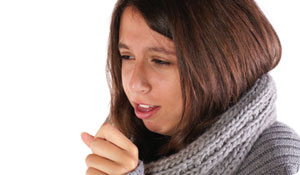
It can start insidiously, with nothing more than symptoms of a cold. But if the diagnosis turns out to be whooping cough, it's a serious and sometimes life-threatening illness.
Whooping cough, also known as pertussis, is increasingly common in the United States, with frequent and troublesome outbreaks. This year, with the number of cases at around 18,000, health experts are calling the outbreak the most serious in 50 years. Part of the reason could be decreasing vaccine protection, according to health officials, as reported by Reuters.
Early symptoms of whooping cough can be very mild, says Len Horowitz, MD, internist and lung specialist at Lenox Hill Hospital in New York City. "Very runny, watery eyes can be a real clue, especially for parents of infants, that this is not just some little virus. In the second phase of the disease, the deep, whooping souns starts and once it does, it can last up to three months."
In addition to a cough so violent and uncontrollable that it can cause vomiting, there are a variety of complications such as middle ear infections.
"The most serious cases of whooping cough are in infants," says Stephen Turner, MD, chief of pediatrics at Downstate Long Island College Hospital in New York City. "And whooping cough is most likely to be fatal in young children."
A recent disturbing rise in the number of cases in 10, 13 and 14-year-olds may indicate that the whooping cough vaccine isn't lasting as long as it had been thought to. This age group received DTaP vaccinations, introduced in 1997 when the previous DTP vaccination was no longer available.
How can you protect yourself and your family?
- Be sure your child gets vaccinated against whooping cough. The first dose is given at two months, and the last of a series of five is given between 4 and 6 years old. After that, kids should get a booster shot around age 11 or 12.
- The vaccination doesn't provide lifelong immunity against whooping cough, so be sure to ask your doctor when you're due to get a whooping cough booster. The whooping cough booster, approved for teenagers and adults, is now combined with the tetanus booster. It's recommended that adults receive this this every 10 years.
- Practice routine good hygiene, Turner says. That means washing your hands often, and making sure your kids wash theirs.
Sources:
"Whooping cough (pertussis)- fact sheet for parents." Centers for Disease Control.
http://www.cdc.gov/vaccines/vpd-vac/pertussis/fs-parents.html
"Pertussis (whooping cough) outbreaks." Centers for Disease Control.
http://www.cdc.gov/pertussis/outbreaks.html
"Whooping cough outbreak: how to keep kids safe." 20 July 2012. CBS News.
http://www.cbsnews.com/8301-504763_162-57476914-10391704/whooping-cough-outbreak-how-to-keep-kids-safe/
Myers, Laura J. "U.S. whooping cough outbreak could be worst in half century." 20 July 2012. Reuters.
http://www.reuters.com/article/2012/07/20/us-usa-whoopingcough-idUSBRE86J05U20120720





